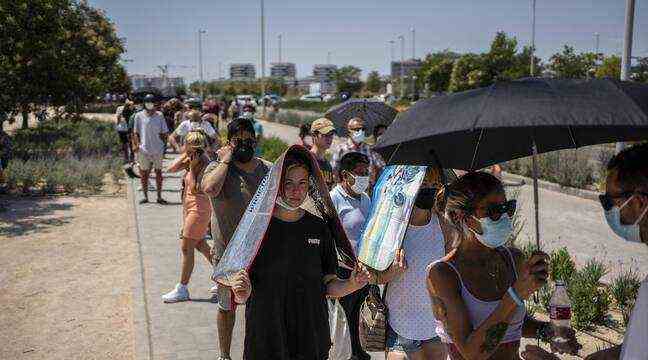Without reluctance or controversy. With around 61% of its population fully vaccinated against the coronavirus, Spain is top of the class in Europe. In addition, more than 70% of Spaniards have already received at least a first dose. With such figures, the country is spared measures (and the debates that go with it) such as the health pass or the vaccination obligation. “We did not have to adopt this measure, because practically all teachers, and practically all citizens, are voluntarily vaccinated,” Education Minister Pilar Alegría commented on Cadena Ser radio on Monday.
Something to make some European governments jealous as in France or last weekend 237,000 people demonstrated across France for the fourth consecutive Saturday. Currently 56% of French people have a complete vaccination schedule. This figure rises to 58% in Italy and 55% in Germany. Even outside the EU, Spain does better than the United Kingdom (58.5%) and the United States (just over 50%).
Unwavering confidence of the population
One of the “key elements” of the success of the vaccination campaign in Spain was “confidence in the health system”, explains Josep Lobera, professor of sociology at the Autonomous University of Madrid. Member of the national committee for vaccination strategy, he was tasked by the authorities to study how the Spaniards were going to accept the vaccine. He and his colleagues found that they were “at an advantage over other countries because confidence in vaccines in general, and in childhood vaccines in particular, has traditionally been higher than in other European countries.”
According to a study conducted in 15 countries by Imperial College London and published in June, 79% of Spaniards were confident in coronavirus vaccines, compared to only 62% of Americans, 56% of French or 47% of Japanese. Professor Lobera explains this attitude by the fact that the Spaniards associate the public health system with modernity, in a country which thirsted for modernity when the dictator Francisco Franco died in 1975.
Strong family solidarity
“I have 100%, 200% confidence” in the health system, launches Inés Gómez Calvo, 28-year-old graphic designer, who waits under the blazing sun in the long queue that leads to the Wizink sports complex in Madrid, transformed into a vaccination center open 24 hours a day. For Alejandro Costales, a 30-year-old lawyer, the vaccine means “taking care” of your family, “being guaranteed to go home, to come back and not to infect them”.
Family ties also play a key role, in a country where more than half (55%) of 25-29 year olds were still living with their parents in 2020, according to the National Statistics Institute. Sociologist Josep Lobera believes that this is a cultural issue, but also an economic one, because “young people have much more difficulty in becoming independent, there is greater job insecurity, and this means that the family played the role of ‘lifeline’ in the crises.
The trauma of polio
The oldest Spaniards also remember the devastation caused to thousands of children born between 1955 and 1965 by the delay in polio vaccination. While in many countries vaccination had started in the mid-1950s, it took almost ten more years in Spain. A neglect concealed by the censorship of the time, which recently led the government to recognize the people who suffered from it as victims of the Franco regime.
“It was an absolutely disastrous situation,” remembers Javier García, president of the Cota Cero association and himself a victim of polio. Now 60 years old and in a wheelchair, Javier García was unable to stand until he was four and underwent 17 leg operations as a child. So when asked about the coronavirus vaccine, he is adamant: “It is important that everyone receives it, and the sooner the better.”

